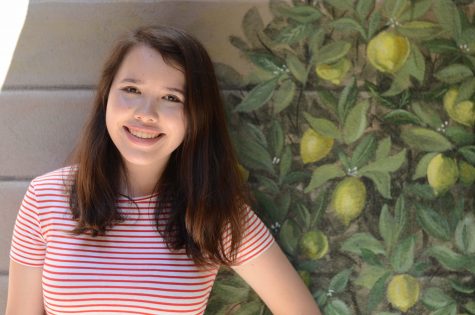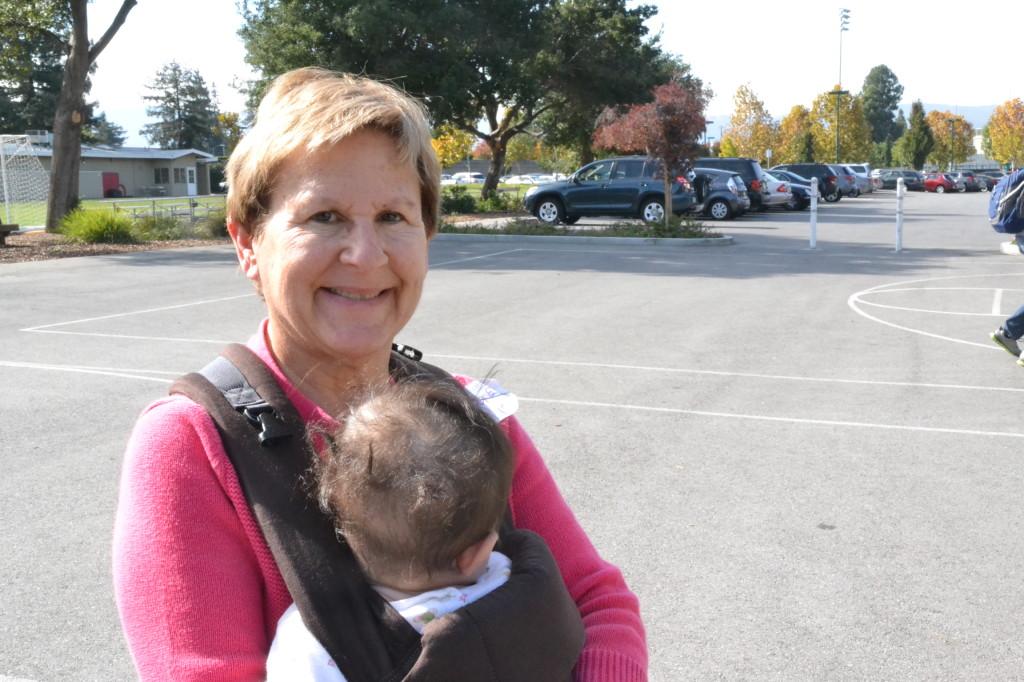AP Psychology students study babies
Marcia Lepler holds her seven month old graddaughter, Maya. The students in AP Psychology spent time playing with babies to understand their cognitive abilities.
Kelly Horan’s AP Psychology students observed babies Wednesday morning as part of their developmental psychology unit.
Infants ranging from six months to three-and-a-half years old, most of whom are children of faculty members, came to the Upper School for 3rd and 4th period.
“It was really fun to bring the kids in and watch the students interact with them and do funny things,” said Marcia Lepler, the grandmother of Economics teacher Samuel Lepler’s children.
Students taking AP Psychology study a variety of subjects, from memory and perception to mental disorders. The difference with the development unit, Horan explained, is that students have more trouble understanding the developing brains of young children because it’s been such a long time since they could relate to that style of thinking.
“We can usually only get in our own minds,” she said. “Not backtrack because our thinking has changed so much.”
By observing and playing with the babies, students were able to get a more hands on and interactive look at brain development in young children.
“The idea was to see some of the theories we studied in action,” Horan said.
Students conducted experiments disguised as games on the babies, testing for a variety of cognitive abilities such as object permanence. They showed a baby a toy and then covered the toy in a blanket in front of the child. Students then recorded whether the baby understood that the object was still there.
The awareness that objects continue to exist even when they cannot be seen of heard, also known as object permanence, marks a jump forward in cognitive ability.
Even though the babies were there for observational purposes, the tone of the activities was more of lighthearted play than serious science, a fact which surprised some students. Shenel Ekici (12) remarked that she expected a work period, but “it was definitely more play than anything else.”
Even so, the novelty of playing with babies didn’t hamper the academic efforts of the exercise. “It was a very educational experience,” Raymond Cheng (12) said. “We were able to relate what we’ve been studying to real life. It was a nice change in pace.”
Despite its academic overtones, the activity was a welcome respite from the busy schedule of a Harker student.

Meilan Steimle (12) is co-Editor-in-Chief of the Winged Post. She was a reporter her freshman year, Winged Post Opinion Editor her sophomore year and Winged...


















![“[Building nerf blasters] became this outlet of creativity for me that hasn't been matched by anything else. The process [of] making a build complete to your desire is such a painstakingly difficult process, but I've had to learn from [the skills needed from] soldering to proper painting. There's so many different options for everything, if you think about it, it exists. The best part is [that] if it doesn't exist, you can build it yourself," Ishaan Parate said.](https://harkeraquila.com/wp-content/uploads/2022/08/DSC_8149-900x604.jpg)




![“When I came into high school, I was ready to be a follower. But DECA was a game changer for me. It helped me overcome my fear of public speaking, and it's played such a major role in who I've become today. To be able to successfully lead a chapter of 150 students, an officer team and be one of the upperclassmen I once really admired is something I'm [really] proud of,” Anvitha Tummala ('21) said.](https://harkeraquila.com/wp-content/uploads/2021/07/Screen-Shot-2021-07-25-at-9.50.05-AM-900x594.png)







![“I think getting up in the morning and having a sense of purpose [is exciting]. I think without a certain amount of drive, life is kind of obsolete and mundane, and I think having that every single day is what makes each day unique and kind of makes life exciting,” Neymika Jain (12) said.](https://harkeraquila.com/wp-content/uploads/2017/06/Screen-Shot-2017-06-03-at-4.54.16-PM.png)








![“My slogan is ‘slow feet, don’t eat, and I’m hungry.’ You need to run fast to get where you are–you aren't going to get those championships if you aren't fast,” Angel Cervantes (12) said. “I want to do well in school on my tests and in track and win championships for my team. I live by that, [and] I can do that anywhere: in the classroom or on the field.”](https://harkeraquila.com/wp-content/uploads/2018/06/DSC5146-900x601.jpg)
![“[Volleyball has] taught me how to fall correctly, and another thing it taught is that you don’t have to be the best at something to be good at it. If you just hit the ball in a smart way, then it still scores points and you’re good at it. You could be a background player and still make a much bigger impact on the team than you would think,” Anya Gert (’20) said.](https://harkeraquila.com/wp-content/uploads/2020/06/AnnaGert_JinTuan_HoHPhotoEdited-600x900.jpeg)

![“I'm not nearly there yet, but [my confidence has] definitely been getting better since I was pretty shy and timid coming into Harker my freshman year. I know that there's a lot of people that are really confident in what they do, and I really admire them. Everyone's so driven and that has really pushed me to kind of try to find my own place in high school and be more confident,” Alyssa Huang (’20) said.](https://harkeraquila.com/wp-content/uploads/2020/06/AlyssaHuang_EmilyChen_HoHPhoto-900x749.jpeg)



